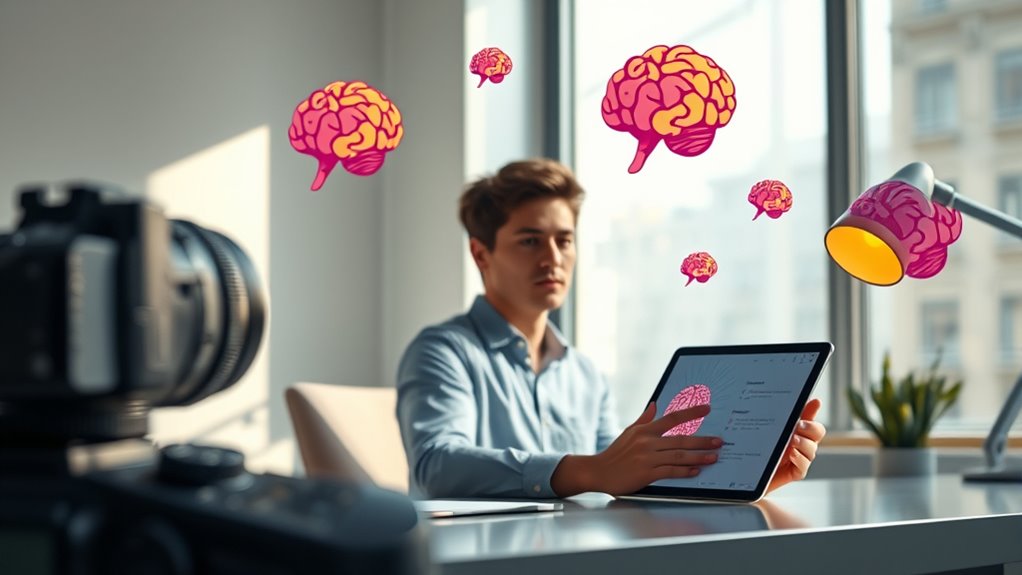Engaging in mental workouts like puzzles, word association games, and vocabulary challenges can boost your focus and cognitive flexibility. Regularly practicing visualization, deep breathing, and quick coordination exercises strengthens neural connections and improves mental clarity. Incorporating these activities into your daily routine enhances attention and resilience while supporting long-term brain health. Keep exploring different techniques, and you’ll discover more ways to sharpen your mind and stay mentally agile.
Key Takeaways
- Mental workouts activate multiple brain regions, enhancing focus, memory, and problem-solving skills.
- Incorporate brief exercises like puzzles and word games to boost mental agility and concentration.
- Visualization and deep breathing techniques improve mental clarity and emotional resilience, supporting sustained focus.
- Regularly practicing focus-enhancing activities develops attention span and mental flexibility over time.
- Integrating mental exercises into daily routines reinforces focus habits and promotes cognitive resilience.
Solve a Puzzle or Brain Teaser
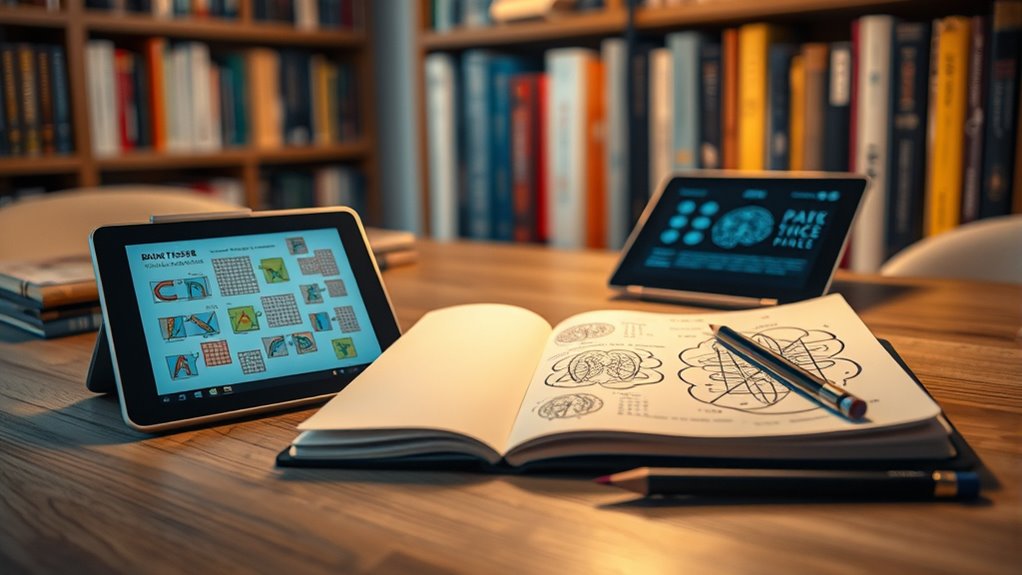
Have you ever wondered how solving puzzles can boost your brainpower? When you tackle puzzles like Sudoku, crosswords, or jigsaw puzzles, you activate multiple brain regions. This activity enhances your memory, focus, and problem-solving skills.
Even quick, five-minute puzzles through apps or print can sharpen your mental agility and boost your cognitive functions. Regularly challenging yourself with puzzles stimulates neural pathways, supporting overall mental fitness and helping delay cognitive decline. Incorporating neural pathways into your mental workouts can lead to more efficient brain processing and adaptability.
Engaging in such mental exercises also encourages positive habits that contribute to mental well-being, making them effective mental workouts and stress relievers. Developing a growth mindset when approaching puzzles can further improve your resilience and perseverance. Additionally, practicing stillness during breaks can enhance your focus and mental clarity, complementing your puzzle routines. Incorporating puzzles into your daily routine can improve your attention span and mental flexibility, contributing to long-term cognitive health.
Play a Word Association or Memory Game
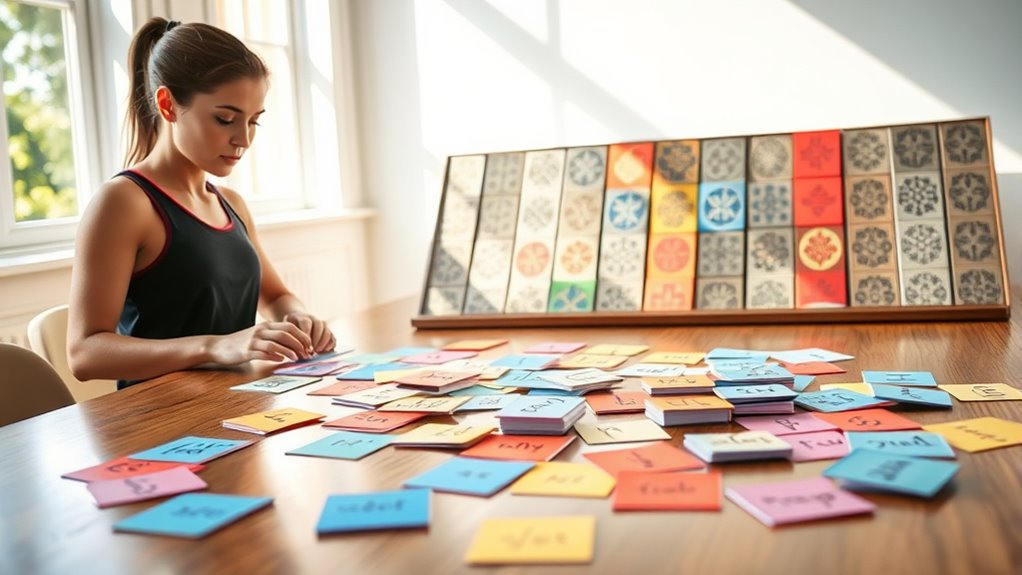
Building on the benefits of puzzle-solving, playing word association or memory games can further sharpen your mental skills. These activities boost verbal fluency, enhance concentration, and strengthen neural connections. Whether you’re linking words quickly or recalling items from memory, you stimulate different brain regions responsible for logic and attention. Regular practice improves cognitive skills across all ages. The integration of Artificial Intelligence into these games can also personalize challenges to better suit individual learning needs. Additionally, incorporating brain training techniques can optimize your mental workouts further, especially when tailored to individual needs and cognitive enhancement strategies. Utilizing neuroplasticity principles allows for more targeted and effective mental exercises. A variety of mental exercises can also help in maintaining overall cognitive health and resilience.
Challenge Yourself With New Vocabulary
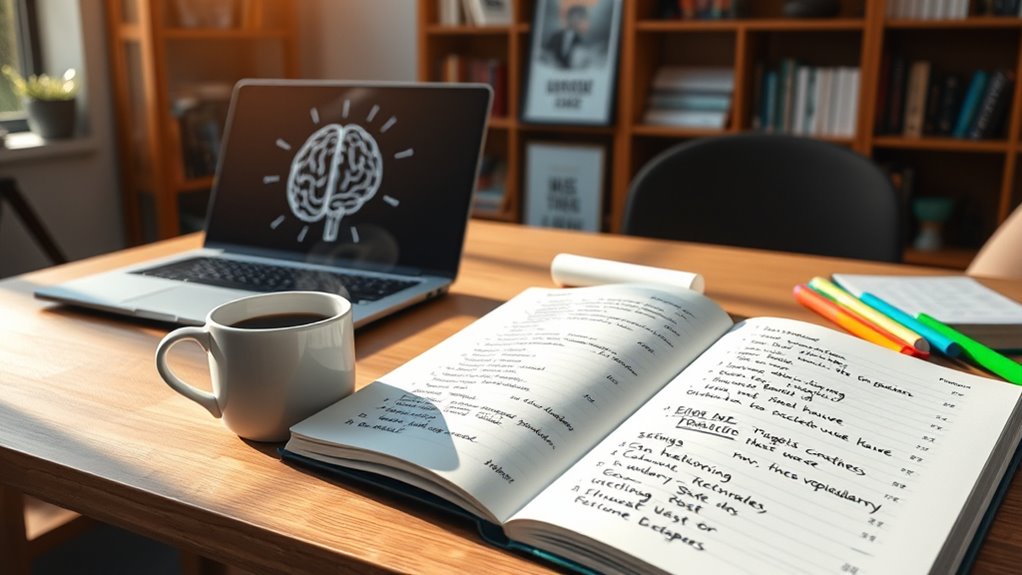
Ever wonder how a single new word can energize your brain? Challenging yourself with new vocabulary boosts mental stimulation and sharpens your skills. Using tools like dictionary apps or “word of the day” features, you expand your vocabulary daily, which helps reinforce retention. Engaging in aquatic exercises can also stimulate your mind by encouraging focus and mindfulness. Practicing these words in sentences or connecting them to familiar concepts makes understanding stick. This process challenges your brain to recognize patterns, enhancing cognitive flexibility and verbal fluency. Incorporating fresh vocabulary into conversations or writing encourages deeper processing, making it easier to recall and apply later. Regularly learning and practicing new words keeps your mind active, supporting cognitive health and lifelong learning. Fokos also emphasizes the importance of understanding your privacy options to maintain a safe browsing environment, which can further support your focus and mental clarity. Additionally, incorporating Glycolic Acid in skincare routines can improve skin health, contributing to overall confidence and well-being, which indirectly supports mental focus. Exploring brain training tools and methods can further optimize your mental workouts and boost overall cognitive function. Being mindful of sun exposure and protecting your skin can also improve your confidence and overall mental well-being, creating a positive feedback loop for focus.
Practice Visualization and Deep Breathing

Practicing visualization and deep breathing can substantially enhance your mental clarity and emotional resilience. When you focus on visualization, imagine calming scenes like beaches or forests, which helps deepen your relaxation. Incorporate mindfulness practices to further strengthen your ability to stay present and focused. Combine this with deep breathing—inhale slowly for four seconds, hold, exhale, and pause—to activate your parasympathetic nervous system and reduce stress. This controlled breathing, paired with vivid imagery, sharpens your focus and boosts emotional regulation. Guided imagery reinforces positive mental states, allowing you to mentally rehearse success or peaceful environments. Regularly practicing these techniques lowers your heart rate and blood pressure, strengthening your mental resilience over time. With consistent effort, visualization and deep breathing become powerful tools for maintaining calmness and focus in stressful moments.
Engage in Quick Physical and Mental Coordination Exercises
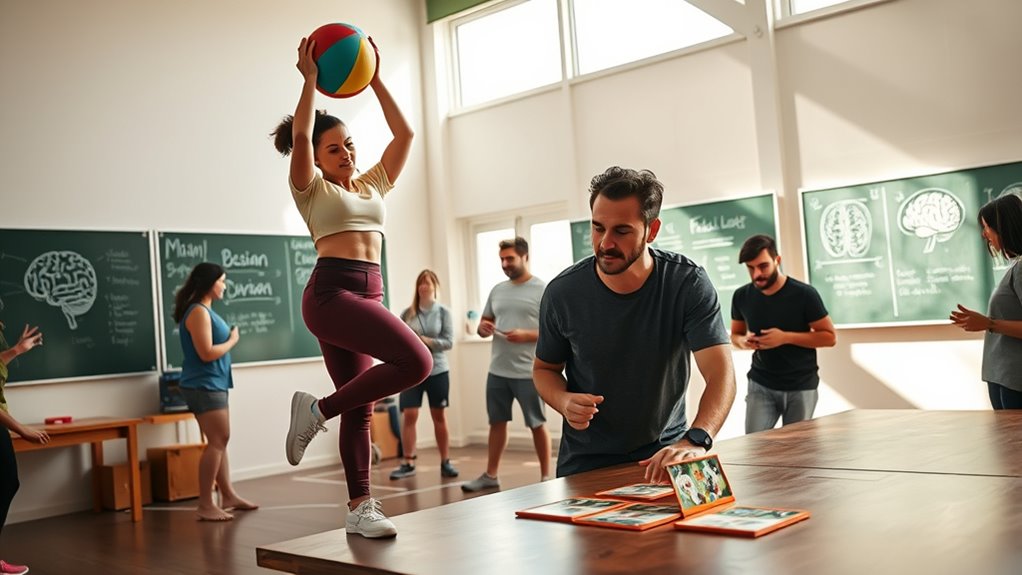
You can boost your focus and coordination by doing quick cross-body movements or rapid word challenges. These exercises activate both sides of your brain, sharpening your mental and physical skills in just minutes. Incorporating them into your routine helps improve attention and mental agility effortlessly. Using mental workouts like these can also enhance your problem-solving skills and overall cognitive function. Be mindful of potential pitfalls when adopting new techniques, ensuring your routines remain safe and effective. Additionally, understanding brain development in early childhood and storytelling can provide inspiration for diverse mental exercises. Recognizing the importance of holistic care models can further support your mental and physical well-being.
Cross-Body Movements
Cross-body movements are simple yet powerful exercises that boost coordination and stimulate neural connections between the brain’s hemispheres. When you perform actions like touching opposite elbows to knees or clapping across your body, you activate bilateral brain activity, strengthening neural pathways. This enhances your cognitive flexibility, making problem-solving and focus easier. Regularly practicing cross-body movements rewires neural circuits, improving attention and mental agility. These quick exercises also support sensory-motor integration, vital for learning and emotional regulation. Engaging in varied movement patterns encourages neuroplasticity, allowing your brain to adapt and improve more rapidly. Incorporating neural pathway strengthening techniques can further amplify these benefits by promoting efficient brain communication. Additionally, exploring different motor control strategies can help diversify neural engagement for more comprehensive brain development. To visualize this, consider the following benefits:
| Benefit | Explanation |
|---|---|
| Coordination | Improves body control and balance |
| Neural Pathways | Strengthens communication between hemispheres |
| Focus | Heightens attention span |
| Cognitive Flexibility | Enhances adaptability in thinking |
| Emotional Regulation | Aids in managing emotions |
Rapid Word Challenges
Have you ever tried quick word association games to boost your mental agility? These rapid word challenges stimulate your brain, sharpen focus, and improve verbal fluency.
When you quickly name related words or create chains of associations, your mind learns to process information faster and make connections more efficiently. Regular practice enhances your cognitive processing speed and strengthens neural pathways involved in language and memory.
Whether you play alone or with others, these exercises boost mental flexibility and creativity while encouraging quick decision-making. Engaging in these fast-paced tasks trains your brain to stay sharp under pressure, making it easier to concentrate during daily activities.
Incorporate quick word challenges into your routine to keep your mind agile and your focus razor-sharp.
Incorporate Focus-Enhancing Activities Into Daily Routines

Integrating focus-enhancing activities into your daily routines can considerably improve concentration and mental agility. Start by scheduling brief mental exercises, like puzzles or word games, during breaks to boost your cognitive agility.
Dedicate a few minutes each day to mindfulness or meditation; this practice sharpens your attention span and mental clarity.
Engage your senses with activities like mindful eating or sensory walks to heighten present-moment awareness and improve focus.
Incorporate movement-based techniques, such as Brain Gym exercises, during shifts to stimulate neural pathways and sustain your concentration.
Establish consistent routines that include mental workouts like journaling or learning new words. These habits reinforce focus habits over time, transforming mental workouts into natural parts of your daily life, ultimately enhancing your overall mental resilience.
Frequently Asked Questions
What Exercise Is Best for Focus?
When asked what exercise is best for focus, it really depends on your needs.
Quick brain exercises like puzzles or memory games can sharpen your attention and mental clarity.
Word association games boost mental flexibility, while learning new words challenges your cognitive control.
Deep breathing with visualization calms your mind and reduces stress.
Try a combination of these exercises to enhance your focus and keep your brain sharp.
What Is Brain Gym for ADHD?
You might wonder if Brain Gym truly helps with ADHD. It involves physical movements like Cross Crawls and Lazy 8s that stimulate neural pathways, aiming to improve focus and coordination.
While scientific evidence is limited, many find these activities promote calmness, reduce hyperactivity, and enhance memory and attention.
If you incorporate these exercises regularly, you may notice better emotional regulation and cognitive flexibility, making daily tasks easier to manage.
What Are Mind Exercises for Concentration?
To boost your concentration, try engaging in puzzles like Sudoku or crosswords, which challenge your problem-solving skills.
Play word association games to improve verbal fluency and quick thinking.
Learning new vocabulary keeps your brain adapting and attentive.
Quick memory exercises, such as recalling lists or matching cards, sharpen your focus.
Also, practice deep breathing and visualization techniques to calm your mind and enhance mental clarity, making it easier to stay attentive.
How to Train Your Brain 🧠?
To train your brain, you should challenge it regularly with puzzles, word games, and memory exercises that sharpen your focus and problem-solving skills.
Incorporate new activities, read diverse materials, and engage all five senses to stimulate neural connections.
Practice mindfulness, meditation, and deep breathing to boost concentration and resilience.
Adding physical movements like cross crawls and Brain Buttons enhances brain function by activating neural pathways, helping you stay sharp and agile.
Conclusion
By consistently practicing these mental workouts, you’ll boost your focus to superhero levels—able to concentrate through a hurricane of distractions. Incorporate puzzles, memory games, and new vocabulary into your daily routine, and watch your mind become sharper than a razor’s edge. Remember, your brain is your most powerful tool—treat it like a champion, and it’ll perform feats of concentration you never thought possible. Get ready to unleash your ultimate mental potential!
